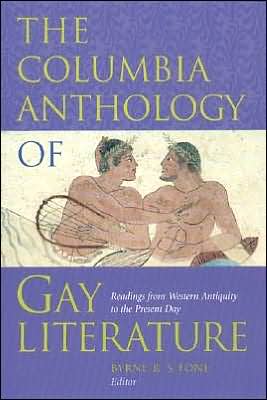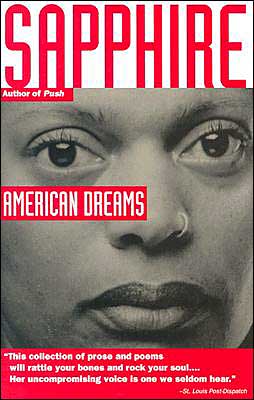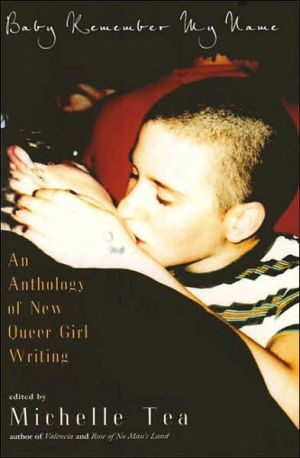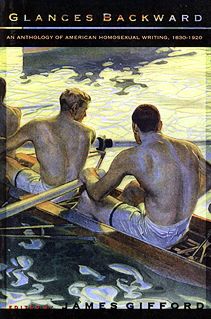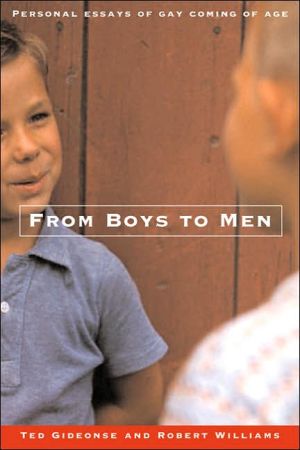The Columbia Anthology of Gay Literature: Readings from Western Antiquity to the Present Day
In the three decades since New York City's Stonewall rebellion, gay literature has exploded as a distinctive form of cultural expression. In a variety of styles and genres, gay men have increasingly begun to articulate their sexual identities. At the same time, gay writers and scholars have begun in earnest the search for a literary history long denied by the refusal to recognize homosexual love as an integral part of Western literature. Yet to date, no single volume has brought together the...
Search in google:
Here at last is a single volume that reveals the bright thread of gay literature throughout the Western tradition. With hundreds of works by authors ranging from Ovid to James Baldwin, from Plato to Oscar Wilde, The Columbia Anthology of Gay Literature presents a wide range of poetry, fiction, essays, and autobiography that depict love, friendship, intimacy, desire, and sex between men. ChoiceThe collection is large enough to provide discoveries and pleasures for readers wishing to introduce themselves to a wide span of gay male texts.
\ \ \ \ \ Chapter One\ 1. The Earliest Texts\ \ \ The Mesopotamian Epic of Gilgamesh, predating Homer by nearly fifteen hundred years, is a tale of adventure, tragedy, and male comradeship that details the meeting and exploits of the two heroes Gilgamesh and Enkidu, and the eventual death of Enkidu, which leaves Gilgamesh inconsolable. In the eighth century B.C.E., the Iliad told the story of the Trojan War and portrayed Achilles and Patroclus as inseparable comrades. Like Gilgamesh, Achilles loses his comrade to death, and like the Gilgamesh, an important element of the Iliad is the grief of Achilles over this loss. The story of David and Jonathan, written around the fifth century B.C.E. in the Hebrew Bible, also describes the intimate companionship of two men, and also includes an account of one lost to death and David's subsequent profound grief. These early texts in general do not specifically imply any sexual connection between their male couples. However, love and intimate friendship is clearly celebrated as an emotion appropriate to relations between men. These stories are the earliest known in literature to reflect such emotions, and they foretell a tradition that would be central to Greek texts and that would be retold in all literary constructions of erotic male relationships.\ \ \ Mesopotamia\ \ \ From the Epic of Gilgamesh (3rd millennium B.C.E.)\ English version by N. K. Sandal's\ The Epic of Gilgamesh is the earliest known text in world literature to celebrate intimate friendship between men. The text has been found in versions inHittite, Akkadian, and Sumerian. The friendship of Gilgamesh and Enkidu is both intense and suggestively passionate. Inseparable friends in life, in death the survivor is inconsolable. To calm the rampaging Gilgamesh, whose sexual appetites are destroying the people, Enkidu is created for him by the goddess of creation. After Gilgamesh defeats Enkidu at wrestling, the two become bound together as one and engage in numerous adventures, one of which results in Enkidu's death by decree of the gods. Gilgamesh, devastated, sings a moving lament for Enkidu, after which he goes on a journey to seek the secret of eternal life, but he cannot forget the loss of his friend.\ \ \ [THE COMING OF ENKIDU]\ Gilgamesh went abroad in the world, but he met with none who could withstand his arms till he came to Uruk.... But the men of Uruk muttered in their houses, "Gilgamesh sounds the tocsin for his amusement, his arrogance has no bounds by day or night. No son is left with his father, for Gilgamesh takes them all, even the children; yet the king should be a shepherd to his people. His lust leaves no virgin to her lover, neither the warrior's daughter nor the wife of the noble; yet this is the shepherd of the city, wise, comely, and resolute." ...\ When Anu had heard their lamentation the gods cried to Aruru, the goddess of creation, "You made him, O Aruru, now create his equal; let it be as like him as his own reflection, his second self, stormy heart for stormy heart. Let them contend together and leave Uruk in quiet."\ So the goddess conceived an image in her mind, and it was of the stuff of Anu of the firmament. She dipped her hands in water and pinched off clay, she let it fall in the wilderness, and noble Enkidu was created. There was virtue in him of the god of war, of Ninurta himself. His body was rough, he had long hair like a woman's; it waved like the hair of Nisaba, the goddess of corn. His body was covered with matted hair like Samuqan's, the god of cattle. He was innocent of mankind; he knew nothing of the cultivated land.\ \ \ [Gilgamesh hears of Enkidu and sends a harlot to seduce him.]\ \ \ She was not ashamed to take him, she made herself naked and welcomed his eagerness; as he lay on her murmuring love she taught him the woman's art. For six days and seven nights they lay together, for Enkidu had forgotten his home in the hills; but when he was satisfied he went back to the wild beasts. Then, when the gazelle saw him, they bolted away; when the wild creatures saw him they fled. Enkidu would have followed, but his body was bound as though with a cord, his knees gave way when he started to run, his swiftness was gone. And now the wild creatures had all fled away; Enkidu was grown weak, for wisdom was in him, and the thoughts of a man were in his heart. So he returned and sat down at the woman's feet, and listened intently to what she said. "You are wise, Enkidu, and now you have become like a god. Why do you want to run wild with the beasts in the hills? Come with me. I will take you to strong-walled Uruk, to the blessed temple of Ishtar and of Anu, of love and of heaven: there Gilgamesh lives, who is very strong, and like a wild bull he lords it over men."\ When she had spoken Enkidu was pleased; he longed for a comrade, for one who would understand his heart. "Come, woman, and take me to that holy temple, to the house of Anu and of Ishtar, and to the place where Gilgamesh lords it over the people. I will challenge him boldly, I will cry out aloud in Uruk, `I am the strongest here, I have come to change the old order, I am he who was born in the hills, I am he who is strongest of all.'"\ She said, "Let us go, and let him see your face. I know very well where Gilgamesh is in great Uruk.... O Enkidu, you who love life, I will show you Gilgamesh, a man of many moods; you shall look at him well in his radiant manhood. His body is perfect in strength and maturity; he never rests by night or day. He is stronger than you, so leave your boasting. Shamash the glorious sun has given favors to Gilgamesh, and Anu of the heavens, and Enlil, and Ea the wise has given him deep understanding. I tell you, even before you have left the wilderness, Gilgamesh will know in his dreams that you are coming."\ Now Gilgamesh got up to tell his dream to his mother, Ninsun, one of the wise gods. "Mother, last night I had a dream. I was full of joy, the young heroes were round me, and I walked through the night under the stars of the firmament, and one, a meteor of the stuff of Anu, fell down from heaven. I tried to lift it but it proved too heavy. All the people of Uruk came round to see it, the common people jostled and the nobles thronged to kiss its feet; and to me its attraction was like the love of woman. They helped me, I braced my forehead and I raised it with thongs and brought it to you, and you yourself pronounced it my brother."\ Then Ninsun, who is well-beloved and wise, said to Gilgamesh, "This star of heaven which descended like a meteor from the sky; which you tried to lift, but found too heavy, when you tried to move it would not budge, and so you brought it to my feet; I made it for you, a goad and spur, and you were drawn as though to a woman. This is the strong comrade, the one who brings help to his friend in his need. He is the strongest of wild creatures, the stuff of Anu; born in the grasslands and the wild hills reared him; when you see him you will be glad; you will love him as a woman and he will never forsake you. This is the meaning of the dream."\ Gilgamesh said, "Mother, I dreamed a second dream. In the streets of strong-walled Uruk there lay an axe; the shape of it was strange and the people thronged round. I saw it and was glad. I bent down, deeply drawn towards it; I loved it like a woman and wore it at my side." Ninsun answered, "That axe, which you saw, which drew you so powerfully like love of a woman, that is the comrade whom I give you, and he will come in his strength like one of the host of heaven. He is the brave companion who rescues his friend in necessity." Gilgamesh said to his mother, "A friend, a counselor has come to me from Enlil, and now I shall befriend and counsel him." ...\ [Enkidu] was merry living with the shepherds, till one day lifting his eyes he saw a man approaching. He said to the harlot, "Woman, fetch that man here. Why has he come. I wish to know his name." She went and called the man, saying, "Sir, where are you going on this weary journey?" The man answered, saying to Enkidu, "Gilgamesh has gone into the marriage-house and shut out the people. He does strange things in Uruk, the city of great streets. At the roll of the drum work begins for the men, and work for the women. Gilgamesh the king is about to celebrate marriage with the Queen of Love, and he still demands to be first with the bride, the king to be first and the husband to follow, for that was ordained by the gods from his birth, from the time the umbilical cord was cut. But now the drums roll for the choice of the bride and the city groans." At these words Enkidu turned white in the face. "I will go to the place where Gilgamesh lords it over the people, I will challenge him boldly, and I will cry aloud in Uruk, `I have come to change the old order, for I am the strongest here.'"\ Now Enkidu strode in front and the woman followed behind. He entered Uruk, that great market, and all the folk thronged round him where he stood in the street in strong-walled Uruk. The people jostled; speaking of him they said, "He is the spit[ting image] of Gilgamesh." "He is shorter." "He is bigger of bone." "This is the one who was reared on the milk of wild beasts. His is the greatest strength." The men rejoiced: "Now Gilgamesh has met his match. This great one, this hero whose beauty is like a god, he is a match even for Gilgamesh."\ In Uruk the bridal bed was made, fit for the goddess of love. The bride waited for the bridegroom, but in the night Gilgamesh got up and came to the house. Then Enkidu stepped out, he stood in the street and blocked the way. Mighty Gilgamesh came on and Enkidu met him at the gate. He put out his foot and prevented Gilgamesh from entering the house, so they grappled, holding each other like bulls. They broke the doorposts and the walls shook, they snorted like bulls locked together. They shattered the doorposts and the walls shook, Gilgamesh bent his knee with his foot planted on the ground and ... Enkidu was thrown. Then immediately his fury died. When Enkidu was thrown he said to Gilgamesh, "There is not another like you in the world. Ninsun, who is as strong as a wild ox in the byre, she was the mother who bore you, and now you are raised above all men, and Enlil has given you the kingship, for your strength surpasses the strength of men." So Enkidu and Gilgamesh embraced and their friendship was sealed.\ \ \ [Gilgamesh and Enkidu further cement their friendship by seeking out and killing the demon Humbaba. They present the head to the god Enlil, but the gods are enraged by this blasphemy. Gilgamesh then confronts the goddess Ishtar who attempts to seduce him, but he refuses to become her lover. Gilgamesh and Enkidu slay the Bull of Heaven, brought by Ishtar to punish Gilgamesh for his rejection, and Ishtar curses them. The council of the gods decrees that one of the pair must die, and the choice falls on Enkidu.]\ \ \ [THE DEATH OF ENKIDU]\ \ \ When the daylight came Enkidu got up and cried to Gilgamesh, "O my brother, such a dream I had last night. Anu, Enlil, Ea, and heavenly Shamash took counsel together, and Anu said to Enlil, `Because they have killed the Bull of Heaven, and because they have killed Humbaba who guarded the Cedar Mountain, one of the two must die.' Then glorious Shamash answered the hero Enlil, `It was by your command they killed the Bull of Heaven, and killed Humbaba, and must Enkidu die although innocent?' Enlil flung round in rage at glorious Shamash, `You dare to say this, you who went about with them every day like one of themselves!'"\ So Enkidu lay stretched out before Gilgamesh; his tears ran down in streams and he said to Gilgamesh, "O my brother, so dear as you are to me, brother, yet they will take me from you." Again he said, "I must sit down on the threshold of the dead and never again will I see my dear brother with my eyes."\ .... As Enkidu slept alone in his sickness, in bitterness of spirit he poured out his heart to his friend. "It was I who cut down the cedar, I who leveled the forest, I who slew Humbaba, and now see what has become of me. Listen, my friend, this is the dream I dreamed last night. The heavens roared, and the earth rumbled back an answer; between them stood I before an awful being, the somber-faced manbird; he had directed on me his purpose. His was a vampire face, his foot was a lion's foot, his hand was an eagle's talon. He fell on me and his claws were in my hair, he held me fast and I smothered; then he transformed me so that my arms became wings covered with feathers. He turned his stare towards me, and he led me away to the palace of Irkalla, the Queen of Darkness, to the house from which none who enters ever returns, down the road from which there is no coming back.... Then I awoke like a man drained of blood who wanders alone in a waste of rushes; like one whom the bailiff has seized and his heart pounds with terror."\ Gilgamesh had peeled off his clothes, he listened to his words and wept quick tears, Gilgamesh listened and his tears flowed. He opened his mouth and spoke to Enkidu: "Who is there in strong-walled Uruk who has wisdom like this? Strange things have been spoken, why does your heart speak strangely? The dream was marvelous but the terror was great; we must treasure the dream whatever the terror; for the dream has shown that misery comes at last to the healthy man, the end of life is sorrow." And Gilgamesh lamented, "Now I will pray to the great gods, for my friend had an ominous dream."\ This day on which Enkidu dreamed came to an end and he lay stricken with sickness. One whole day he lay on his bed and his suffering increased. He said to Gilgamesh, the friend on whose account he had left the wilderness, "Once I ran for you, for the water of life, and I now have nothing." A second day he lay on his bed and Gilgamesh watched over him, but the sickness increased. A third day he lay on his bed, he called out to Gilgamesh, rousing him up. Now he was weak and his eyes were blind with weeping. Ten days he lay and his suffering increased, eleven and twelve days he lay on his bed of pain. Then he called to Gilgamesh, "My friend, the great goddess cursed me and I must die in shame. I shall not die like a man fallen in battle; I feared to fall, but happy is the man who falls in the battle, for I must die in shame." And Gilgamesh wept over Enkidu. With the first light of dawn he raised his voice and said to the counselors of Uruk:\ \ \ [THE LAMENT OF GILGAMESH FOR ENKIDU]\ \ \ "Hear me, great ones of Uruk,\ I weep for Enkidu, my friend,\ Bitterly moaning like a woman moaning\ I weep for my brother.\ O Enkidu, my brother,\ You were the axe at my side,\ My hand's strength, the sword in my belt,\ The shield before me,\ A glorious robe, my fairest ornament;\ An evil Fate has robbed me.\ The wild ass and the gazelle\ That were father and mother,\ All long-tailed creatures that nourished you\ Weep for you,\ All the wild things of the plain and pastures;\ The paths that you loved in the forest of cedars\ Night and day murmur.\ Let the great ones of strong-walled Uruk\ Weep for you;\ Let the finger of blessing\ Be stretched out in mourning;\ Enkidu, young brother. Hark,\ There is an echo through all the country\ Like a mother mourning.\ Weep all the paths where we walked together;\ And the beasts we hunted, the bear and hyena,\ Tiger and panther, leopard and lion,\ The stag and the ibex, the bull and the doe.\ The river along whose banks we used to walk,\ Weeps for you,\ Ula of Elam and dear Euphrates\ Where once we drew water for the water-skins.\ The mountain we climbed where we slew the Watchman,\ Weeps for you.\ The warriors of strong-walled Uruk\ Where the Bull of Heaven was killed,\ Weep for you.\ All the people of Eridu\ Weep for you Enkidu.\ Those who brought grain for your eating\ Mourn for you now;\ Who rubbed oil on your back\ Mourn for you now;\ Who poured beer for your drinking\ Mourn for you now.\ The harlot who anointed you with fragrant ointment\ Laments for you now;\ The women of the palace, who brought you a wife,\ A chosen ring of good advice,\ Lament for you now.\ And the young men your brothers\ As though they were women\ Go long-haired in mourning.\ What is this sleep which holds you now?\ You are lost in the dark and cannot hear me."\ \ \ \ He touched his heart but it did not beat, nor did he lift his eyes again. When Gilgamesh touched his heart it did not beat. So Gilgamesh laid a veil, as one veils the bride, over his friend. He began to rage like a lion, like a lioness robbed of her whelps. This way and that he paced round the bed, he tore out his hair and strewed it around. He dragged off his splendid robes and flung them down as though they were abominations.\ In the first light of dawn Gilgamesh cried out, "I made you rest on a royal bed, you reclined on a couch at my right hand, the princes of the earth kissed your feet. I will cause all the people of Uruk to weep over you and raise the dirge of the dead. The joyful people will stoop with sorrow; and when you have gone to the earth I will let my hair grow long for your sake, I will wander through the wilderness in the skin of a lion." The next day also, in the first light, Gilgamesh lamented; seven days and seven nights he wept for Enkidu, until the worm fastened on him. Only then he gave him up to the earth, for the Anunnaki, the judges, had seized him.\ Then Gilgamesh issued a proclamation through the land, he summoned them all, the coppersmiths, the goldsmiths, the stone-workers, and commanded them, "Make a statue of my friend." The statue was fashioned with a great weight of lapis lazuli for the breast and of gold for the body. A table of hard-wood was set out, and on it a bowl of camelian filled with honey, and a bowl of lapis lazuli filled with butter. These he exposed and offered to the Sun; and weeping he went away.\ \ \ The Old Testament\ The Friendship of David and Jonathan\ \ \ The friendship of Jonathan, son of King Saul, and the shepherd David (c. 1012-872 B.C.E.) is one of the few texts in the Old Testament to provide an approved example of intimate friendship between men. The story has served as a subject for numerous literary texts celebrating male-male love, such as Peter Abelard's medieval interpretation of the story in the "Lament for Jonathan," Abraham Cowley's epic Davideis (1656), John Addington Symonds's poem The Meeting of David and Jonathan (1878), and Wallace Hamilton's novel David at Olivet (1979).\ \ \ 1 Samuel 17:55-58 AND 18:1-4\ Authorized (King James) Version\ And when Saul saw David go forth against the Philistine [Goliath], he said unto Abner, the captain of the host, Abner, whose son is this youth? And Abner said, As thy soul liveth, O King, I cannot tell.\ And the King said, Inquire thou whose son the stripling is.\ And as David returned from the slaughter of the Philistine, Abner took him, and brought him before Saul, with the head of the Philistine in his hand.\ And Saul said to him, Whose son art thou, young man? And David answered, I am the son of thy servant Jesse the Beth-lehemite.\ And it came to pass, when he had made an end of speaking unto Saul, that the soul of Jonathan was knit with the soul of David, and Jonathan loved him as his own soul.\ And Saul took him that day, and would let him go no more home to his father's house.\ Then Jonathan and David made a covenant, because he loved him as his own soul.\ And Jonathan stripped himself of the robe that was upon him, and gave it to David, and his garments, even to his sword, and to his bow, and to his girdle.\ \ \ David's Lament for Jonathan\ \ \ 2 Samuel 1:17-27\ Authorized (King lames) Version\ And David lamented with this lamentation over Saul and over Jonathan his son:\ .... The beauty of Israel is slain upon thy high places: how are the mighty fallen!\ Tell it not in Garb, publish it not in the streets of Askelon; lest the daughters of the Philistines rejoice, lest the daughters of the uncircumcised triumph.\ Ye mountains of Gilboa, let there be no dew, neither let there be rain, upon you, nor fields of offerings: for there the shield of the mighty is vilely cast away, the shield of Saul, as though he had not been anointed with oil.\ From the blood of the slain, from the fat of the mighty, the bow of Jonathan turned not back, and the sword of Saul returned not empty.\ Saul and Jonathan were lovely and pleasant in their lives, and in their death they were not divided: they were swifter than eagles, they were stronger than lions.\ Ye daughters of Israel, weep over Saul, who clothed you in scarlet, with other delights, who put on ornaments of gold upon your apparel.\ How are the mighty fallen in the midst of the battle! O Jonathan, thou wast slain in thine high places.\ I am distressed for thee, my brother Jonathan: very pleasant hast thou been unto me: thy love to me was wonderful, passing the love of women.\ How are the mighty fallen, and the weapons of war perished!
1. Inventing Eros: Literature of the Ancient World2. Inventing Sodom — The European Middle Ages3. Platonic Dialogues — European and English Literature from the Fourteenth to the Seventeenth Century: 4. Reinventing Sodomites — Homophobia and Resistance (1625-1869)5. Heirs of Eros — English Literature (1850-1969)6. Modern Love — European Writers from 18707. Masculine Landscapes — American Literature 1840 to 19088. Deconstructing "Manhood" — American Literature 1916 to 19699. Out There — American Literature from 1969
\ CHOICEThe collection is large enough to provide discoveries and pleasures for readers wishing to introduce themselves to a wide span of gay male texts.\ \ \ \ \ \ ChoiceThe collection is large enough to provide discoveries and pleasures for readers wishing to introduce themselves to a wide span of gay male texts.\ \ \ ChoiceThe collection is large enough to provide discoveries and pleasures for readers wishing to introduce themselves to a wide span of gay male texts.\ \ \ \ \ Library JournalSuperbly conceived and edited, this anthology functions as a source companion to Gregory Woods's brilliant History of Gay Literature (LJ 4/1/98). Though its obvious use might be as a textbook, Fone's (CCNY) selections are thoughtfully interesting, and many are outside the gay canon. As such, even experienced readers of gay literature will discover hidden treasures here. Fone provides material from all Western literary traditions across 2000 years, and what makes his anthology even more wonderful is his including all genres of literature, not just the usual poetry and fiction, from ancient epic to modern personal political essays. Fone also provides introductory essays for each section and biographical notes for each author. This book will contribute mightily to discussions of the gay canon. Highly recommended.David S. Azzolina, Univ. of Pennsylvania Libs., Philadelphia\ \ \ \ \ BooknewsA chronological presentation of selected gay literature in the Western tradition from to the poems of Allen Ginsberg. Territories covered include Greek homoerotic poetry, anti-sodomy laws in the early years of the millennium, the Platonic dialogues, homoeroticism in English literature from the 1500s and 1600s, and modern gay literature from Whitman to Ginsberg. Annotation c. by Book News, Inc., Portland, Or.\ \ \ \ \ Kirkus ReviewsEditor Fone (English/CUNY) offers what may well be the landmark gay anthology the publisher claims it to beþa volume that, unlike similar collections, includes a broad range of genres. Even straights should be moved by the passion in much of the material here, especially the Walt Whitman and Constantine Cavafy poems. Selections begin with Sumerian lore, span classical Greek and Latin, continue through European, English, Latin American, and American literary periods, and end with modern gay writing since 1969 (James Baldwin, Edmund White, and others). Less canonical than Whitman, Auden, Baldwin, etc., are authors of the hidden heritage, who balance Fone's wide selection of essential homoerotic writers. He apologizes that his space doesnþt allow for including examples of the gay drama springing from Mart Crowley's seminal Boys in the Band (1968), but each historical period bears its own introduction. Fone's editorial "we" refers to gay men rather than lesbians, who have their own texts and anthologies. Students and nonacademics will find this commendably readable. (Reader's Subscription Book Club selection)\ \
